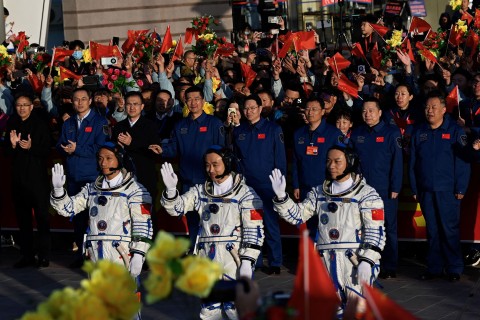
China is slated to send another crew to its Tiangong space station on Thursday, in the latest mission for a growing space programme that plans to send people to the moon by 2030.
The Shenzhou-17 is scheduled to blast off from the Jiuquan launch site in arid northwest China at 11:14 am (0314 GMT), carrying a three-astronaut team with the youngest average age since the space station’s construction.
A send-off ceremony on Thursday morning saw the space travellers bid farewell to observers before heading off to prepare for the rocket launch.
Members of the previous Shenzhou-16 crew — aboard Tiangong for nearly five months now — are currently preparing to receive the trio before returning to Earth next week.
Captaining the next team is Tang Hongbo, who is on his first return mission to the space station.
Accompanying him will be Tang Shengjie and Jiang Xinlin, both in their thirties and each making maiden space voyages. The all-male crew has an average age of 38, compared to 42 for the crew of Shenzhou-16 when it launched.
Tiangong, the crown jewel of Beijing’s space programme, is constantly crewed by rotating teams of three astronauts.
Plans for China’s “space dream” have been put into overdrive under President Xi Jinping.
The world’s second-largest economy has pumped billions of dollars into its military-run space programme in an effort to catch up with the United States and Russia.







